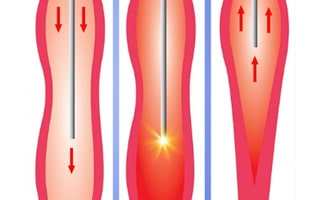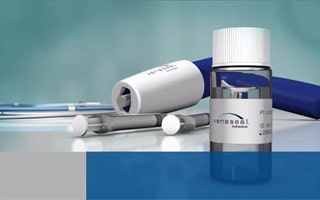Frequently Asked Questions
What steps does a vein specialist takes to treat varicose veins?
In case of varicose veins, the vein specialist shall preferably be an interventional radiologist. Normally, a doctor diagnoses varicose veins by physical clinical examination. Confirmatory detailed ultrasound is also done by doctor to conclusively diagnose the condition.
Treatment of patient, if EVLT/VenaSeal is suitable, is done on out-patient basis and patient returns home same day. In a day patient can resume normal activities. Patient should have symptomatic relief immediately. It’s a good practice to have a follow up check-up with doctor.
Patient may be advised to wear compression stockings for some time.
This is a normal routine and treatment plan for a patient can only be decided by doctor after check -up.
Can varicose return even after treatment?
The treatments offered presently for varicose veins and spider veins have very high success rates when compared to traditional surgical options.
However, with time more abnormal veins may develop as there is no medically approved cure for weak vein valves.
Diagnostics like ultrasound are used to identify the level of leakage in the valves (venous insufficiency). Medication under guidance can help contain this issue for the patients.
Will one procedure eliminate my varicose veins?
While the current treatments offered for varicose vein like EVLT are well tested and observe high success rates at good institutions, with time there is chance of development of more abnormal vein. It depends on various factors of patient condition.
Patient should consult doctor if experience symptoms. Mostly the patients may avoid serious redevelopment of varicose vein if timely consult doctor and practice some exercise/precautions.
How laser treatment is different from other varicose veins treatment options?
Laser treatment (Popularly referred as EVLT) has very high success rate, it is non – surgical with fast results and in most cases does not requires admission. There is no use of any chemicals and if patient condition permits anaesthesia may also not be administered. However, each patient needs to get evaluated for EVLT to formalize treatment plan. Please consult with your specialist doctor, an interventional radiologist.
How long do I need to stay out of normal activities after the procedure?
EVLT procedure is mostly an outpatient procedure unless patient condition requires admission. Mostly no anaesthesia is administered hence patient returns to home within few hours. Depending on condition, patient may be advised to rest for a day before resuming any strenuous routine. Normal routine can be taken up same day or next day.
When to seek medical advice for varicose veins?
Varicose Vein is a medical condition which may largely effect quality of life of patient in its initial stages. If a patient experiences discomfort & pain in legs with mild to heavy swelling, leg muscle cramps, throbbing & burning feeling in legs, development of dark patches, slow healing sores etc. it is good to get evaluated by a specialist before the problem increases.
What can happen if I don’t treat my varicose veins?
Varicose vein in itself may not be life threatening condition, but it may significantly hamper patient quality of life and in extreme cases leads to development of more serious medical condition which may be fatal.
Are compression stockings actually an effective treatment?
Compression stockings are not treatment but may provide symptomatic relief to the patient. Varicose veins is a medical condition with respect to blood flow in veins and compression stockings help relieve some of the symptoms for patients. It is not treatment.
Does my insurance cover laser treatment for varicose veins? Yes. While coverage depends on type of medical policy, in most policies varicose vein treatment like EVLT shall be covered.
Will removing varicose veins affect the blood flow?
Under EVLT, affected vein in the leg is not removed but incapacitated and closed. Blood flow in our body does not depend on one vein and closure doesn’t affect normal blood flow. In any case, at endovascular clinic patient is fully evaluated before the procedure to identify any other medical condition. Patients should ask their treating doctors about the procedure and make an informed decision.
If a varicosed vein is blocked or removed, will it be bad for circulation?
No. Varicose veins are already malfunctioning, so that means they're already interfering with healthy, normal circulation.
By preventing blood from flowing through these diseased veins and rerouting it naturally through healthy neighboring veins, normal circulation can be restored.
Why should I choose Endovascular Clinic for my varicose veins treatment?
Endovascular clinic is a doctor driven institution with dedicated team for vein related procedures. We help patient understand the condition & recommend the patient with optimum treatment plan as per the condition.
The specialist, Dr. Bhavesh Popat is recognized and highly experienced interventional radiologist who provides information to patient in most convenient manner so that patient takes a fully informed decision.
Patients can connect us for second opinion also and we shall be happy to provide information. Decision is always patients.

